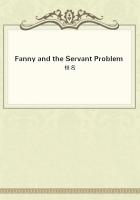"You, too," he said, "it would obviate the interruption of your work, about which you feel so keenly. You would be able to go on with it. Of myself, I don't think at all. I shall be lonely, no doubt, at Ashbridge, but my own personal feelings must not be taken into account. Yes; it seems to me a very sensible notion. We shall have to see what your mother says to it. She might not like me to be away from her, in spite of her apparent--er--dislike of me. It must all depend on her attitude. But for my part I think very well of your scheme. Thank you, Michael, for suggesting it."He left immediately after this to ascertain Lady Ashbridge's feelings about it, and walked home with a complete resumption of his usual exuberance. It indeed seemed an admirable plan. It relieved him from the nightmare of his wife's continual presence, and this he expressed to himself by thinking that it relieved her from his. It was not that he was deficient in sympathy for her, for in his self-centred way he was fond of her, but he could sympathise with her just as well at Ashbridge. He could do no good to her, and he had not for her that instinct of love which would make it impossible for him to leave her. He would also be spared the constant irritation of having Michael in the house, and this he expressed to himself by saying that Michael disliked him, and would be far more at his ease without him. Furthermore, Michael would be able to continue his studies . . . of this too, in spite of the fact that he had always done his best to discourage them, he made a self-laudatory translation, by telling himself that he was very glad not to have to cause Michael to discontinue them. In fine, he persuaded himself, without any difficulty, that he was a very fine fellow in consenting to a plan that suited him so admirably, and only wondered that he had not thought of it himself. There was nothing, after his wife had expressed her joyful acceptance of it, to detain him in town, and he left for Ashbridge that afternoon, while Michael moved into the house in Curzon Street.
Michael entered upon his new life without the smallest sense of having done anything exceptional or even creditable. It was so perfectly obvious to him that he had to be with his mother that he had no inclination to regard himself at all in the matter; the thing was as simple as it had been to him to help Francis out of financial difficulties with a gift of money. There was no effort of will, no sense of sacrifice about it, it was merely the assertion of a paramount instinct. The life limited his freedom, for, for a great part of the day he was with his mother, and between his music and his attendance on her, he had but little leisure. Occasionally he went out to see his friends, but any prolonged absence on his part always made her uneasy, and he would often find her, on his return, sitting in the hall, waiting for him, so as to enjoy his presence from the first moment that he re-entered the house. But though he found no food for reflection in himself, Aunt Barbara, who came to see them some few days after Michael had been installed here, found a good deal.
They had all had tea together, and afterwards Lady Ashbridge's nurse had come down to fetch her upstairs to rest. And then Aunt Barbara surprised Michael, for she came across the room to him, with her kind eyes full of tears, and kissed him.
"My dear, I must say it once," she said, "and then you will know that it is always in my mind. You have behaved nobly, Michael;it's a big word, but I know no other. As for your father--"Michael interrupted her.
"Oh, I don't understand him," he said. "At least, that's the best way to look at it. Let's leave him out."He paused a moment.
"After all, it is a much better plan than our living all three of us at Ashbridge. It's better for my mother, and for me, and for him.""I know, but how he could consent to the better plan," she said.
"Well, let us leave him out. Poor Robert! He and his golf. My dear, your father is a very ludicrous person, you know. But about you, Michael, do you think you can stand it?"He smiled at her.
"Why, of course I can," he said. "Indeed, I don't think I'll accept that statement of it. It's--it's such a score to be able to be of use, you know. I can make my mother happy. Nobody else can.
I think I'm getting rather conceited about it.""Yes, dear; I find you insufferable," remarked Aunt Barbara parenthetically.
"Then you must just bear it. The thing is"--Michael took a moment to find the words he searched for--"the thing is I want to be wanted. Well, it's no light thing to be wanted by your mother, even if--"He sat down on the sofa by his aunt.
"Aunt Barbara, how ironically gifts come," he said. "This was rather a sinister way of giving, that my mother should want me like this just as her brain was failing. And yet that failure doesn't affect the quality of her love. Is it something that shines through the poor tattered fabric? Anyhow, it has nothing to do with her brain. It is she herself, somehow, not anything of hers, that wants me. And you ask if I can stand it?"Michael with his ugly face and his kind eyes and his simple heart seemed extraordinarily charming just then to Aunt Barbara. She wished that Sylvia could have seen him then in all the unconsciousness of what he was doing so unquestioningly, or that she could have seen him as she had with his mother during the last hour. Lady Ashbridge had insisted on sitting close to him, and holding his hand whenever she could possess herself of it, of plying him with a hundred repeated questions, and never once had she made Michael either ridiculous or self-conscious. And this, she reflected, went on most of the day, and for how many days it would go on, none knew. Yet Michael could not consider even whether he could stand it; he rejected the expression as meaningless.















